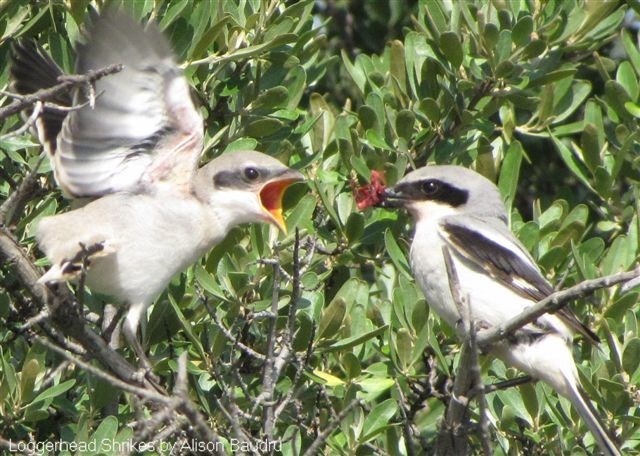We all know that hungry babies are insistent, but these babies sure do make a lot of noise! Loggerhead Shrikes (a.k.a Butcherbirds) have particularly noisy little ones, and they just might startle you if you’re not ready for them. The little masked bandits will steal away your quiet lazy afternoon, and have you looking around for the culprit!
These migratory songbirds are a threatened species and Saskatchewan is an important part of their breeding range. They return to the Canadian prairies each spring from their wintering grounds in southern Texas and Mexico; and right now, their chicks are hatching - noisily!
“Now is the best time to see the adult Loggerhead Shrikes because they are constantly on the search for food, to feed their ravenous nestlings. While some chicks are in the nest growing feathers and muscle in preparation for flight, others have jumped ship and are clumsily following their parents out on hunting expeditions”, explains Shirley Bartz, Habitat Stewardship Coordinator with Nature Saskatchewan. “The adults’ hunting strategies include perching high on a twig, hovering above a field and diving onto prey, or walking on the ground while flashing their white wing patches to startle prey into movement”.
The shrikes provide natural pest control as their diet consists largely of grasshoppers and other insects. They also eat mice, voles, frogs, small birds, and even snakes! Shrikes will sometimes take prey larger than they are. However, with their little songbird feet, they are unable to grip their prey and tear pieces off like a hawk would. To get around this, shrikes impale their prey on thorns or barbed-wire, and then use their hooked beak to tear off edible bits. “This is how they got the name Butcherbird,” says Shirley, “because they hang their meat like your neighbourhood butcher.”
Loggerhead Shrikes are slightly smaller than a robin, with a white breast and belly, a grey back, and contrasting white markings on their black wings and tail. They also have a distinctive black eye “mask” and a black hooked beak. Adults Loggerhead Shrikes have a song composed of short bubbling trills, as well as a variety of rasps and clacks. When alarmed Shrikes give a distinctive high pitch shriek.
Nature Saskatchewan delivers a voluntary stewardship program called Shrubs for Shrikes that works with rural landowners to conserve this species at risk. They are asking anyone who sees a Loggerhead Shrike, or impaled prey, to call their toll free line at 1-800-667-4668 to help them monitor the population. “Personal information is never shared without permission”, adds Shirley.




